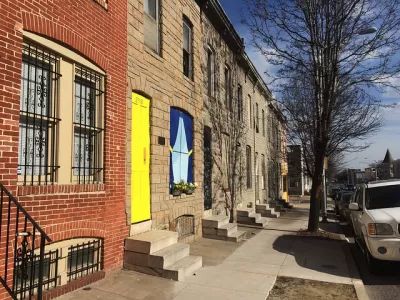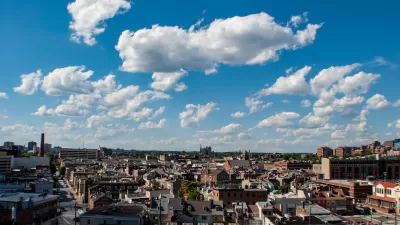Community land trusts are a favorite tool of advocates who want to take a communitarian approach to property and public space in cities facing the challenges of population decline, blight, and gentrification.

Kevon Paynter reports on the advocacy efforts in support of community land trusts as a solution for the threat of displacement in the threat of gentrification in many formerly blighted neighborhoods in the city of Baltimore.
"Community groups in Baltimore believe land trusts could be the way to keep families living affordably in a fast-gentrifying city," writes Paynter, before introducing the concept of community land trusts and also examining in context of the Baltimore neighborhood of McElderry Park.
The experiences of McElderry Park and others around the city have led advocates to coalesce behind the cause of the United Not Blighted campaign, which wants the city to invest $40 million in community land trusts. Mayor Catherine Pugh has the power to add the funding to the city budget, and, according to Paynter, the goal is a plausible one. There are already two community land trusts in operation in the city, including the Amazing Port Street Project in East Baltimore, which have created a track record of success for the model in the city.
Finally, Paynter frames community land trusts as a solution not just to affordable housing in the face of gentrification, but also of blight in neighborhoods dotted with vacant properties.
FULL STORY: Baltimore’s Push to Solve Its Affordable Housing Crisis With Community Land Trusts

Planetizen Federal Action Tracker
A weekly monitor of how Trump’s orders and actions are impacting planners and planning in America.

Congressman Proposes Bill to Rename DC Metro “Trump Train”
The Make Autorail Great Again Act would withhold federal funding to the system until the Washington Metropolitan Area Transit Authority (WMATA), rebrands as the Washington Metropolitan Authority for Greater Access (WMAGA).

The Simple Legislative Tool Transforming Vacant Downtowns
In California, Michigan and Georgia, an easy win is bringing dollars — and delight — back to city centers.

The States Losing Rural Delivery Rooms at an Alarming Pace
In some states, as few as 9% of rural hospitals still deliver babies. As a result, rising pre-term births, no adequate pre-term care and "harrowing" close calls are a growing reality.

The Small South Asian Republic Going all in on EVs
Thanks to one simple policy change less than five years ago, 65% of new cars in this Himalayan country are now electric.

DC Backpedals on Bike Lane Protection, Swaps Barriers for Paint
Citing aesthetic concerns, the city is removing the concrete barriers and flexposts that once separated Arizona Avenue cyclists from motor vehicles.
Urban Design for Planners 1: Software Tools
This six-course series explores essential urban design concepts using open source software and equips planners with the tools they need to participate fully in the urban design process.
Planning for Universal Design
Learn the tools for implementing Universal Design in planning regulations.
Smith Gee Studio
City of Charlotte
City of Camden Redevelopment Agency
City of Astoria
Transportation Research & Education Center (TREC) at Portland State University
US High Speed Rail Association
City of Camden Redevelopment Agency
Municipality of Princeton (NJ)




























